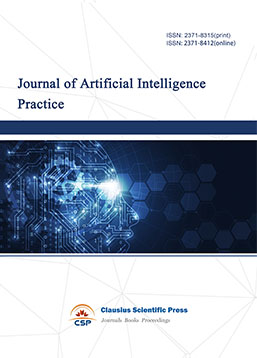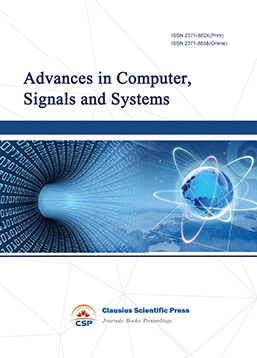A Collaborative Filtering Algorithm Based on Sentiment Analysis in Review Texts
DOI: 10.23977/autml.2023.040210 | Downloads: 91 | Views: 2953
Author(s)
Xinyu Yang 1, Ning Liu 2
Affiliation(s)
1 College of Economics Management, Shangluo University, Shangluo, 726000, China
2 Engineering Research Center of Qinling Health Welfare Big Data, Universities of Shaanxi Province, Shangluo, 726000, China
Corresponding Author
Ning LiuABSTRACT
To improve the performance of collaborative filtering algorithm, a collaborative filtering algorithm based on sentiment analysis in review texts (CF_SA) is proposed in this paper. First, LDA (Latent Dirichlet Allocation) is used to form the user topic feature matrix and calculate user review similarity. Secondly, the ALBERT(A Lite Bidirectional Encoder Representation from Transformers) model and BiLSTM(Bi-directional Long Short-Term Memory) neural network are used to mine users' emotional tendencies in item review texts, improve the user rating table, and calculate user rating similarity. Next, the user review similarity and user rating similarity are combined to obtain the final user similarity and predict the user's rating for the item. Finally, experiments were conducted on the Douban Film Review dataset. Compared with classic recommendation algorithms, the results show that the proposed algorithm has good recommendation performance.
KEYWORDS
Sentiment analysis, review text, collaborative filtering, recommendation algorithmCITE THIS PAPER
Xinyu Yang, Ning Liu, A Collaborative Filtering Algorithm Based on Sentiment Analysis in Review Texts. Automation and Machine Learning (2023) Vol. 4: 68-75. DOI: http://dx.doi.org/10.23977/autml.2023.040210.
REFERENCES
[1] Duo Lin, Yang Bing. (2020) A recommendation rating prediction method based on user interest concept lattice. Journal of Chinese Computer Systems, 10, 2104-2108.
[2] Huang Liwei, Jiang Bitao, Lv Shouye, et al. (2018) Review of recommender systems based on deep learning. Chinese Journal of Computers, 7, 1619-1647.
[3] Deng S, Huang L, Xu G, et al. (2017) On Deep learning for trust-aware recommendations in social networks. IEEE Transactions on Neural Networks & Learning Systems, 5, 1164-1177.
[4] Zhao Yehui, Liu Lin, Wang Hailong, Han Haiyan, Pei Dongmei. (2023) Survey of Knowledge Graph Recommendation System Research. Journal of Frontiers of Computer Science and Technology, 4, 771-791.
[5] Wu Sen, Dong Yaxian, Wei Guiying, Gao Xiaonan. (2022) Research on User Similarity Calculation of Collaborative Filtering for Sparse Data. Journal of Frontiers of Computer Science and Technology, 5, 1043-1052.
[6] Du Y, Wang L, Peng Z, et al. (2021) Based hierarchical attention cooperative neural networks for recommendation. Neurocomputing, 447, 38-47.
[7] Guang L, Michael R, Irwin K. (2014) Ratings meet reviews, a combined approach to recommend. 8th ACM Conference on Recommender Systems. Foster City: ACM, 105-112.
[8] Cataldo M, Claudio G, Alessandro S, et al. (2016) Ask me any rating: A content-based recommender system based on recurrent neural networks.IIR. Proceedings of the Gustav Lorentzen Natural Working Fluids Conference. Edinburgh: International Institute of Refrigeration, 288-296.
[9] Dong Chenlu, Ke Xinsheng. (2018) Study on Collaborative Filtering Algorithm Based on User Interest Change and Comment. Computer Science, 3, 213-217.
[10] Wu L, Quan C, Li C, et al. (2019) A context-aware user-item representation learning for item recommendation. ACM Transactions on Information Systems, 2, 1-29.
[11] Tay Y, Luu A T, Hui S C. Multi-pointer co-attention networks for recommendation. ACM Proceedings of the 24th ACM SIGKDD International Conference on Knowledge Discovery & Data Mining. London: ACM, 2018, 2309-2318.
[12] Chen Chong, Zhang Min, Liu Yiqun, et al. (2018) Neural attentional rating regression with review-level explanations. The 2018 World Wide Web Conference, Lyon, France, 1583–1592.
[13] Lan Z Z, Chen M, Goodman S, et al. (2019) ALBERT: A lite BERT for self-supervised learning of language representations. arXiv: 1909.11942.
[14] Zhu Qianqian, Lan Wenfei, Sun Hui, et al. (2022) Recommendation algorithm ABFR based on sentiment classification of user comment text. Journal of South-Central Minzu University (Natural Science Edition), 41(03):333-338.
| Downloads: | 4738 |
|---|---|
| Visits: | 233751 |
Sponsors, Associates, and Links
-
Power Systems Computation

-
Internet of Things (IoT) and Engineering Applications

-
Computing, Performance and Communication Systems

-
Journal of Artificial Intelligence Practice

-
Advances in Computer, Signals and Systems

-
Journal of Network Computing and Applications

-
Journal of Web Systems and Applications

-
Journal of Electrotechnology, Electrical Engineering and Management

-
Journal of Wireless Sensors and Sensor Networks

-
Journal of Image Processing Theory and Applications

-
Mobile Computing and Networking

-
Vehicle Power and Propulsion

-
Frontiers in Computer Vision and Pattern Recognition

-
Knowledge Discovery and Data Mining Letters

-
Big Data Analysis and Cloud Computing

-
Electrical Insulation and Dielectrics

-
Crypto and Information Security

-
Journal of Neural Information Processing

-
Collaborative and Social Computing

-
International Journal of Network and Communication Technology

-
File and Storage Technologies

-
Frontiers in Genetic and Evolutionary Computation

-
Optical Network Design and Modeling

-
Journal of Virtual Reality and Artificial Intelligence

-
Natural Language Processing and Speech Recognition

-
Journal of High-Voltage

-
Programming Languages and Operating Systems

-
Visual Communications and Image Processing

-
Journal of Systems Analysis and Integration

-
Knowledge Representation and Automated Reasoning

-
Review of Information Display Techniques

-
Data and Knowledge Engineering

-
Journal of Database Systems

-
Journal of Cluster and Grid Computing

-
Cloud and Service-Oriented Computing

-
Journal of Networking, Architecture and Storage

-
Journal of Software Engineering and Metrics

-
Visualization Techniques

-
Journal of Parallel and Distributed Processing

-
Journal of Modeling, Analysis and Simulation

-
Journal of Privacy, Trust and Security

-
Journal of Cognitive Informatics and Cognitive Computing

-
Lecture Notes on Wireless Networks and Communications

-
International Journal of Computer and Communications Security

-
Journal of Multimedia Techniques

-
Computational Linguistics Letters

-
Journal of Computer Architecture and Design

-
Journal of Ubiquitous and Future Networks


 Download as PDF
Download as PDF